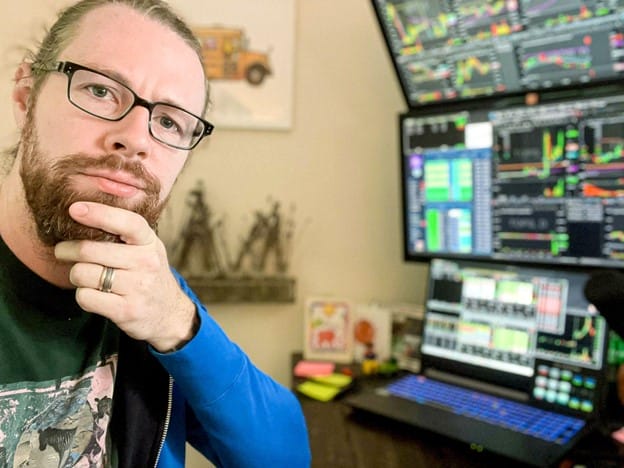
It might seem like simple common sense — almost a truism — to say that traders need to trade in the market they’re in. After all, in what other market can they possibly trade? But expert day trader Ross Cameron of Warrior Trading says far too often, traders forget this very basic rule. Instead, they trade the market they wish to be in. And that’s when things start going wrong.
Trading isn’t easy. But it’s also not rocket science, says Warrior Trading’s Ross Cameron. You can learn the essentials — how to read volume and price charts, how to pick a stock, how to make a trade. But it’s one thing to learn the concepts and another thing entirely to apply these concepts in a live market.
“There are some complex things to really understand the concepts of how trading works, so you do require a basic intelligence aptitude, just to start. That doesn’t mean you need to be a college graduate,” says Cameron.
This is why Cameron recommends beginners learn to trade in a simulator rather than in the live markets.
Try the Markets Before You Buy the Markets
A trading simulator is precisely what it sounds like — an interactive platform that reproduces the behavior and features of the stock market. Users set up accounts and practice trading stocks without financial risk.
Cameron’s company, Warrior Trading, offers lessons on how to trade and provides access to a simulator.
“We give our students the opportunity to trade in a simulator, so they can start practicing right away,” he says. “We’ve had students who have made and lost over a billion dollars in the simulator because they do crazy things. But it’s a tool for them to use and experiment with. And it’s a safe place to start learning and applying some of the things that they’ve been learning in the classes.”
As well as being intelligent, day traders also tend to have another common trait, he says.
“You need to be a critical thinker. You need to be a bit of a problem solver,” Cameron states.
Usually, he adds, people who become day traders are those with a more independent personality and people who like solving puzzles.
There’s an emotional disposition that these individuals stitch together, thinks Cameron. People who day-trade are often curious, individual thinkers who don’t want to follow the rules of society like being weighed down in a wage-earning job.
But then there’s the psychology of trading, which involves discipline and rule-setting. And when free-thinking individualists who don’t like following the rules are suddenly confronted with the day-to-day job of executing a strategy, it can be a real challenge for them.
“That really is the biggest challenge for every trader I’ve ever known, including me,” says Warrior Trading’s Ross Cameron. “You can know all the textbook stuff about trading, and then you find yourself in the heat of the moment, throwing it all out the window and making emotionally impulsive decisions.”
Following Your Gut Will Lead You in the Wrong Direction
In those moments, Cameron says a lot of people end up making a gut decision that’s not based on the outcomes of their research or their strategy — but also isn’t based on experience or intuition.
“You might be telling yourself [you’re using your intuition and intelligence], but it’s actually [a decision] based on an emotional response,” says Cameron, explaining that the trader may have just experienced a loss, frustration, or anger because they’ve lost money — or had something happen in their personal life.
“And suddenly you can start snowballing,” Cameron warns.
One of the things that people don’t expect when they start trading is that the practice forces them to really look at themselves in the mirror. It forces them to have self-control, be disciplined, and develop a real sense of awareness.
For instance, when trading in a bear market, which was the market for most of 2022, traders often try to convince themselves a bull market is just around the corner, always looking for the signs and often seeing them everywhere.
Last year, Cameron still managed to have a great year, but he says it was entirely because of his ability to restrain himself and slow down to trade the market that he met, not the market that he wanted it to be.
“We all want to have a home run market every day, where we make a ton of money. But that’s not reality. So, you can either choose to accept the current reality or fight it,” says Cameron. “And people that fight it dig themselves big holes.”
It can be incredibly difficult to teach even the smartest person this simple fact, Cameron thinks.
Taking Trading Seriously Takes Discipline, Says Warrior Trading’s Ross Cameron
Cameron explains that while he has a blueprint for the way that he trades, and that he can share the blueprint with people (starting at a high level with simple trading and market concepts, and then drilling all the way down to the most minute and detailed nuances of his strategy), prospective traders need to bring some things to the table to make it happen.
“And one of those things is an ability to have the discipline to follow the rules of the strategy,” says Warrior Trading’s Cameron. “Because when someone says, ‘Ross, I’m struggling [with my] trading,’ and then they tell me, ‘Well, I’m using my iPhone, I’m trading on Robinhood,’ they have, in that moment, disregarded everything that I teach, and they’ve tried to go their own way.”
Cameron advises his students to take trading seriously, to trade on a desktop, and use a professional platform.
For Cameron, it’s an interesting contradiction that the type of people attracted to day trading are often very independent and very driven. And yet those people can also be the type who don’t like following the set of rules required to be a successful trader.
Fiercely independent, driven people are often more apt to struggle when learning how to trade. Yet people who are more prone to following the rules and do exactly as they’re told might not be inclined to take the risk that they would need to take to be successful day traders.
But for Warrior Trading’s Ross Cameron, one thing is certain. Whether you’re a fierce individualist or a rule follower, you need to remember: Trade the market you’re in, not the market you wish you were in.
Read More
Here Are Six Inflation Proof Stocks To Invest In Right Now






Comments